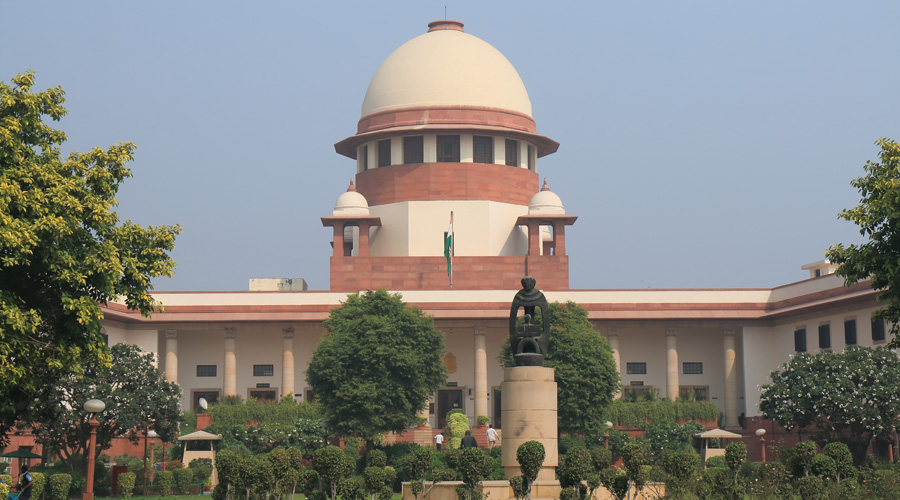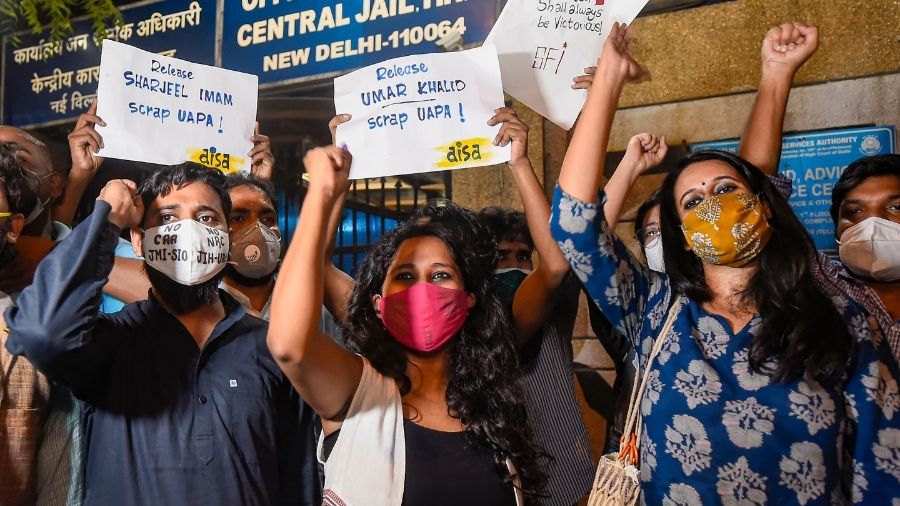The Supreme Court on Friday refrained from quashing the bail awarded to three student anti-CAA protesters but said the Delhi High Court judgment granting the relief “shall not be treated as a precedent and may not be relied upon by any of the parties in any of the proceedings”.
Solicitor-general Tushar Mehta had earlier claimed the government had no objections to the trio’s bail as long as the apex court directed that the high court’s interpretation of the Unlawful Activities Prevention Act (UAPA) would not count as a precedent in any proceedings involving the anti-terror law or the three students’ co-accused.
This was clearly a tactical move by a government that had tried every trick to keep Devangana Kalita, Natasha Narwal and Asif Iqbal Tanha in jail even after the grant of bail, but was aware that precedent suggested the apex court was unlikely to stay the bail.
To defend his contention, Mehta went so far as to cite Rajiv Gandhi — whom the government he represents usually invokes for negative references — arguing the high court’s interpretation of the UAPA left no room for even the former Prime Minister’s assassin to be booked in a terror case.
Mehta won support from senior advocate and Congress veteran Kapil Sibal, who was representing the students, to his stand that the high court judgment needed to be revisited.
The bench of Justices Hemant Gupta and V. Ramasubramanian issued notices to the three students seeking their replies within four weeks. It asked that the next hearing be listed in the “week commencing” from July 19, when the high court judgment is expected to come under the scanner.
Justice Gupta, who headed the bench, agreed with Mehta that the high court appeared to have gone beyond the subject in hand while deciding the bail application.
“In a bail application, 100 pages of judgment and judges discussing all law — that’s what is surprising us,” the judge observed.
Terror & murder
Rajiv analogy
While granting bail on June 15, the high court had said the phrase “terrorist act” cannot be applied in a “cavalier manner” to criminal acts that fall under the ambit of the Indian Penal Code.
Mehta argued that according to the high court, the UAPA should not be invoked against conventional offences — however grave — that fall within Entry 1 of List 11 (state list) which is about public order, or Entry 1 of list 111 (concurrent list) which is about criminal law.
“So, if I kill someone in a murder attempt and I can be booked under (IPC Section) 302 (murder), UAPA would not apply even if I am a terrorist?” Mehta said.
“They have watered down the act and read it down and they say (that) otherwise it would not pass muster (with) Parliament.”
The bench remarked: “The issue is important and would have pan-India ramifications. We would like to issue notice and hear the parties and then decide the matter for the good of the entire country.”
The high court had said the allegations against the students were, “at worst”, evidence of their participation in organising protests against the new citizenship regime, but did not prove that they “incited violence” or committed or conspired to commit “a terrorist act as understood in the UAPA”.
Mehta argued that if the same yardstick were applied to Rajiv’s assassination by the LTTE, it would absolve the killer.
“The high court says that the (students’) protest was under a perceived belief that the CAA is anti-people and so on.... If we go by this judgment, then even the lady who assassinated the former Prime Minister was protesting, only because her views (were)... something that went against the government.”
Mehta underlined that the February 2020 Delhi riots had killed 53 people and injured more than 400, and that if the high court judgment were accepted, the right to protest would include the right to kill people.
The basis of his argument was the Delhi police allegation that the students had, by participating in the anti-CAA protests, incited the riots — a charge the accused have denied.
Mehta said that if the high court judgment were accepted, a large number of other terror accused would also be queuing before the courts for bail. The terror case against the three students names 12 other accused, of whom only one has received bail — on the ground of pregnancy.
Sibal said he agreed with the bench that the high court judgment should not be treated as a precedent and needed a proper interpretation by the Supreme Court because it had wide ramifications.
“We need to have a judgment of this court, which will otherwise impact everybody,” Sibal said.
Mehta pleaded: “The high court has made wide-ranging observations when so many people died and hundreds were injured. I’m suggesting that if the accused are out on bail, let them remain out. I’m not asking for cancelling their bail. I’m not asking for a stay that nullifies that effect. But please stay the judgment.”
The bench remarked: “We agree with you that many questions arise. The constitutionality of UAPA was not even challenged — it was a bail application only. That is why we are issuing notice.”
It added: “In the meantime, the impugned judgment shall not be treated as a precedent and may not be relied upon by any of the parties in any of the proceedings.”











